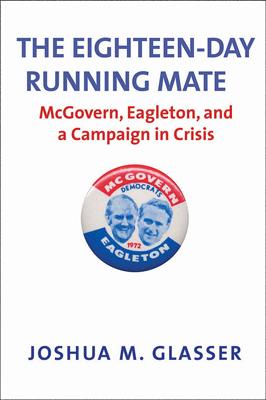How Not to Pick a Running Mate
Interview by Nicholas Mancusi ’10
[Politics] In the summer of 1972, Democratic presidential candidate George McGovern tapped Thomas Eagleton to be his running mate. Over the next 18 days, a pair of anonymous phone calls alleged that Eagleton had undergone treatment for depression. Ultimately, McGovern was compelled to withdraw his selection. The entire episode is covered in a new book by Joshua Glasser ’10. I spoke with my classmate about the book, which began as his senior thesis.

When did you become interested in Eagleton’s story?
In March 2007, my freshman year at Amherst, my mom read Eagleton’s New York Times obituary and had it waiting for me when I came home for spring break. She had been an early McGovern supporter and recalled the sadness she felt over the Eagleton episode that summer of ’72. She also discerned the intersection of three of my passions: politics, journalism and Amherst.
What made you think that your thesis could have a second life as a book?
While working on my thesis, my adviser, Hilary Moss in the history department, would say to me, “Josh, it’s a book, not a thesis,” and a part of me believed her. Two other professors and popular historians whom I took classes with while at Amherst—Joseph Ellis of Mount Holyoke and Marni Sandweiss of Princeton—also read my thesis and urged me to turn it into a book. I was lucky enough to find an agent and editor willing to take it on.
How do you think Eagleton’s time at Amherst affected his life and career?
Aside from the academic foundation, Eagleton honed his rhetorical prowess on the debate team, and he tested his meddle as a leader—and socializer—in Delta Kappa Epsilon. Eagleton’s mother died while he was at Amherst, and Tom took time off, enlisting in the navy for a year. That experience put his goals in focus, and he returned to Amherst determined to get into politics.
What main lesson should presidential candidates take from the episode when selecting running mates? Using this lens, how did Mitt Romney do in selecting Paul Ryan?
There is the obvious lesson of executing a complete background check, including mental health history. But then there are the more nuanced lessons. It is vital to forge a ticket that is unified by more than just a hyphen, a ticket unmarred by competition between running mates, and one that’s characterized by easy communication and rapport. Romney had the time to test out how he felt with different options on the campaign trail, which was a huge advantage. Superficially, though, Ryan and Eagleton are quite similar: 42-year-old Catholics from Midwestern swing states.
Does mental health history matter as much today as it did in 1972? And should it have mattered so much then?
In the post-Watergate, post-Clinton, post-Bush era, I think we’re much more aware of the fallibility of our leaders and much more forgiving of their imperfections. But the unpredictability of Eagleton’s condition (bipolar II disorder) still causes some psychiatrists to doubt Eagleton’s fitness for the vice presidency. As sad as it may be, it was right that Eagleton’s mental illness mattered in ’72. Eagleton’s doctors told McGovern they had doubts about his fitness for the Oval Office, given what they knew about Eagleton’s condition and the even greater limitations of psychotropic drugs back then, in the pre-lithium era.
How well did McGovern handle the crisis?
After McGovern and Eagleton preempted the press and divulged Eagleton’s mental health history at a press conference, Eagleton was off campaigning in California and Hawaii, where he was buoyed by the positive energy of his crowds. McGovern stayed on his vacation in the Black Hills of South Dakota, where the press and his aides created a negative feedback loop that led him to believe he had little choice but to drop his running mate. Instead of picking up the telephone and telling Eagleton directly that he had changed his mind, McGovern kept reassuring Eagleton he had his support. At the same time, he and his aides attempted to telegraph his decision through the press, but it all came off as sloppy manipulation.
Though [McGovern] still thinks the whole situation was a “lose-lose proposition,” he told me during an interview that he should have stuck with his initial support of his running mate and told the press, “Yes, yes [Eagleton] had suffered from depression. So did Abraham Lincoln; so did Winston Churchill. And we’re going to keep an eye on this. If we see any evidence of the senator being ill, we’ll deal with it.”
Is the legacy of Eagleton’s brief campaign a positive or negative influence on presidential politics?
The optimist in me would like to believe it will be a positive as future candidates heed its lessons, not only in selecting a running mate but also in crisis management, communication, decision-making and how campaigns should handle the press. McCain missed the memo.
Mancusi, a writer in New York City, is a Daily Beast contributor. He blogs at Galleyist.com.